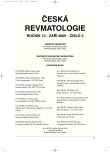-
Medical journals
- Career
Polymorphism of the tumor necrosis factor promoter region in patients with rheumatoid arthritis
Authors: P. Němec 1; M. Goldbergová 2; M. Souček 1; D. Polášková 2; A. Vašků 2
Authors‘ workplace: II. interní klinika, FN u sv. Anny v Brně, 2Ústav patologické fyziologie, Lékařská fakulta MU Brno 1
Published in: Čes. Revmatol., 13, 2005, No. 3, p. 84-88.
Category: Original Papers
Overview
Introduction.
Rheumatoid arthritis (RA) is a model of multigenic disorder and genetic factors may be implicated in a susceptibility to disease initiation as well as a severity of disease course. Tumor necrosis factor alpha (TNF alpha) is a pleiotropic pro-inflammatory cytokine implicated in stimulation of T-cell immune response, up-regulation of proteolytic enzymes, prostaglandins, chemokines, over-expression of adhesion or HLA class II molecules. Elevated levels of TNF-alpha in plasma and synovial fluid from patients with rheumatoid arthritis may be associated with gene polymorphisms of TNF alpha and TNF beta.Aim.
The aim of this study was to elucidate putative association between -308 G/A polymorphism of TNF-alpha promotor region and its susceptibility to disease onset and severity of rheumatoid arthritis.Methods.
All 100 patients that fulfilled revised criteria of American College of Rheumatology (ACR) for rheumatoid arthritis, with disease duration of 2 years minimum, were divided in 4 subgroups according the radiographic progression (typical classification according to Steinbrocker: stage I: non-destructive – 10 patients, stage II-IV. destructive form – 90 patients). Control group was characterized with similar age and sex distribution.Results.
No difference of genotype distribution and frequency of allelic polymorphism of -308 G/A TNF alpha have been found between patients with rheumatoid arthritis and control groups. Significant differences have been observed in genotype polymorphism -308 G/A TNF-alpha between the subgroups of rheumatoid arthritis patients. Patients with destructive form of RA (stage II-IV) revealed increased amount of GG genotype (odds ratio=4.70, P=0.03). When most destructive form (stage IV) and non-destructive form (stage I) were compared, more than 10 times higher risk of the most severe joint affection for patients with GG genotype (odds ratio=10.5, P=0.009) was observed.Conclusion.
These results show association of GG polymorphism of –308 G/A TNF-alpha with more severe course of rheumatoid arthritis.Key words:
Rheumatoid arthritis, gene, polymorphism, TNF-alpha
Labels
Dermatology & STDs Paediatric rheumatology Rheumatology
Article was published inCzech Rheumatology

2005 Issue 3-
All articles in this issue
- Antibodies against cyclic citrullinated peptide (anti-CCP) in serum and synovial fluid from patients with rheumatoid arthritis and osteoarthritis
- Polymorphism of the tumor necrosis factor promoter region in patients with rheumatoid arthritis
- Dysimmune myopathies (idiopathic inflammatory myopathies)
- Standard recommendations for the management of psoriatic arthritis
- Association of rheumatoid arthritis and Castleman’s disease
- Cryoglobulinemic vasculitis in a patient with chronic hepatitis C infection
- Czech Rheumatology
- Journal archive
- Current issue
- Online only
- About the journal
Most read in this issue- Antibodies against cyclic citrullinated peptide (anti-CCP) in serum and synovial fluid from patients with rheumatoid arthritis and osteoarthritis
- Cryoglobulinemic vasculitis in a patient with chronic hepatitis C infection
- Dysimmune myopathies (idiopathic inflammatory myopathies)
- Association of rheumatoid arthritis and Castleman’s disease
Login#ADS_BOTTOM_SCRIPTS#Forgotten passwordEnter the email address that you registered with. We will send you instructions on how to set a new password.
- Career

